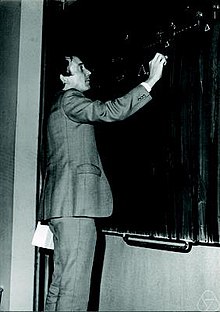Arnold Schönhage (born 1 December 1934 in Lockhausen, now Bad Salzuflen) is a German mathematician and computer scientist.
Professor Arnold Schönhage | |
|---|---|
 Schönhage in 1973 | |
| Born | December 1, 1934 |
| Nationality | German |
| Alma mater | University of Cologne |
| Known for | Schönhage–Strassen algorithm, Odlyzko–Schönhage algorithm, Schönhage's Storage Modification Machine (SMM) model. Splitting circle method. |
| Scientific career | |
| Fields | Mathematics |
| Institutions | University of Konstanz, University of Tübingen, Rheinische Friedrich-Wilhelms-Universität, Bonn |
| Doctoral advisor | Guido Hoheisel |
Schönhage was professor at the Rheinische Friedrich-Wilhelms-Universität, Bonn,[1] and also in Tübingen and Konstanz.[2]
Together with Volker Strassen, he developed the Schönhage–Strassen algorithm for the multiplication of large numbers[1][3] that has a runtime of O(N log N log log N). For many years, this was the fastest way to multiply large integers, although Schönhage and Strassen predicted that an algorithm with a run-time of N(logN) should exist. In 2019, Joris van der Hoeven and David Harvey finally developed an algorithm with this runtime, proving that Schönhage's and Strassen's prediction had been correct.[4]
Schönhage designed and implemented together with Andreas F. W. Grotefeld and Ekkehart Vetter a multitape Turing machine, called TP, in software. The machine is programmed in TPAL, an assembler language. They implemented numerous numerical algorithms, including the Schönhage–Strassen algorithm, on this machine.
The Odlyzko–Schönhage algorithm[5] from 1988 is regularly used in research on the Riemann zeta function.
References
edit- ^ a b Luerweg, Frank (December 21, 2004). "Weltrekord-Rechenmethode kommt zu späten Ehren". Informationsdienst Wissenschaft. Retrieved 2023-10-21.
- ^ "Arnold Schönhage". The Mathematics Genealogy Project. North Dakota State University. Retrieved 2023-10-21.
- ^ Fischer, Lars (April 11, 2019). "Mathematik: Die schnellste Art zu multiplizieren". Spektrum der Wissenschaft (in German). Retrieved 2023-10-21.
- ^ Klarreich, Erica (2019-12-20). "Multiplication hits the speed limit". Communications of the ACM. 63 (1): 11–13. doi:10.1145/3371387. ISSN 0001-0782. S2CID 209450552.
- ^ Odlyzko, A. M.; Schonhage, A. (1988). "Fast Algorithms for Multiple Evaluations of the Riemann Zeta Function". Transactions of the American Mathematical Society. 309 (2): 797–809. doi:10.2307/2000939.